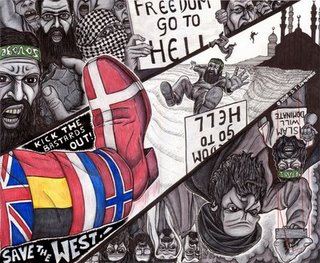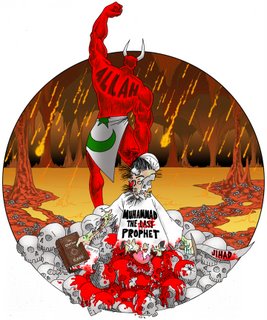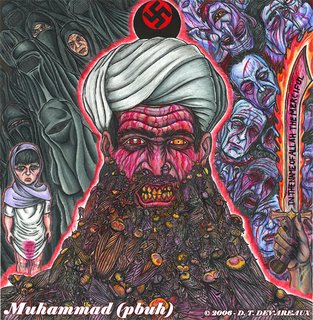Beyond posturing
Cartoon controversy highlights need for dialogue
(from the U of T Bulletin, Mar 6/06)
by Safiyyah Ally
Much has been written about the Danish newspapers that dared publish 12 cartoons depicting the Prophet Muhammad in a manner that many Muslims deemed sacrilegious and demeaning. The newspaper claimed the cartoons were “part of an ongoing public debate on freedom of expression” in Denmark. The Muslim reaction has been swift and overwhelming, ranging from street demonstrations and the boycotting of Danish goods to flag trampling, the burning of buildings and, tragically, the loss of lives.
 Stepping back from the fray, one is able to observe how misguided the loudest voices are, even as each side claims the moral high ground. Perhaps the most lamentable aspect of this cartoon controversy is the reality that neither those who support nor those who protest the publication of the cartoons have reached across the divide in order to properly understand the other.
Stepping back from the fray, one is able to observe how misguided the loudest voices are, even as each side claims the moral high ground. Perhaps the most lamentable aspect of this cartoon controversy is the reality that neither those who support nor those who protest the publication of the cartoons have reached across the divide in order to properly understand the other.
“Defenders of free speech” want to pit opponents as crazies bent upon censorship and lacking any nuanced understanding of the foundational principles of Danish society. This characterization is unfair. There may be some Muslims who do not understand the concept of free speech, but many others do. And while defenders of free speech rightly argue that liberal democratic societies afford individuals the right to criticize religion, free speech is never absolute. The imprisonment of Holocaust denier David Irving is one example of the way in which a liberal democratic society chooses to weigh free speech against other significant values — in this case, the need to ensure that the ideas that led to the horrific atrocities of the Second World War do not again gain credence among the general public. The French government’s ban on the headscarf in public spaces is another case that highlights the limits of free speech. Muslims recognize that the cartoon controversy is not just a debate about the meaning of free speech.
 It would be difficult to craft a law that would prevent a religion from being denigrated while preserving the sanctity of free speech — for this reason, blasphemy laws have fallen into disuse. But one need not require that free speech be limited by law. Societal norms of civil discourse already place limits upon free speech, not because of a desire to stifle thoughts and ideas but rather because of an appreciation of the impossibility of living in a society in which individuals think it acceptable to verbally attack each other. Civil discourse exists on a higher plane than does free speech, setting limits that are often not enacted by law but rather are agreed upon by individuals within society. One observes those rules in play when editors decide not to publish images of dead bodies in New Orleans or not to post nudes on their front page — or when the Danish newspaper that published the Muhammad cartoons rejected a Jesus cartoon two years ago. These decisions are made out of a certain level of knowledge of and respect for one’s readership. One could argue then that the Danish newspaper that published the 12 cartoons violated the unwritten rules of civil discourse.
It would be difficult to craft a law that would prevent a religion from being denigrated while preserving the sanctity of free speech — for this reason, blasphemy laws have fallen into disuse. But one need not require that free speech be limited by law. Societal norms of civil discourse already place limits upon free speech, not because of a desire to stifle thoughts and ideas but rather because of an appreciation of the impossibility of living in a society in which individuals think it acceptable to verbally attack each other. Civil discourse exists on a higher plane than does free speech, setting limits that are often not enacted by law but rather are agreed upon by individuals within society. One observes those rules in play when editors decide not to publish images of dead bodies in New Orleans or not to post nudes on their front page — or when the Danish newspaper that published the Muhammad cartoons rejected a Jesus cartoon two years ago. These decisions are made out of a certain level of knowledge of and respect for one’s readership. One could argue then that the Danish newspaper that published the 12 cartoons violated the unwritten rules of civil discourse.
The protests by Muslims mask a greater fear that the responsibility to protect minority communities — itself an important element in liberal democratic societies — is not being respected. The cartoons are not just about free speech; they are also about marginalizing a minority community. The Muslim community in Denmark is tiny — approximately 210,000 individuals identify as Muslims. When Muslims object to the cartoons, some may be doing so because of their reverence and love for the Prophet Muhammad, and in this sense, they may be imposing their own religious views on those who do not share them. But an argument could be made that while Muslims want to be part of Danish society, they cannot do so when they are alienated and made to feel inferior. The cartoons feature the most highly regarded individual among Muslims in a manner demeaning to his stature. Is there any question Muslims are going to feel like the “other”? Defenders of the cartoons need to understand the deep-seated fear amongst Muslims that this is not simply about ridicule of Muhammad; rather, it is a troubling attack on Islam and Muslims. When elements of the dominant society irresponsibly critique minority communities, they run the risk of silencing elements of society, stripping individuals of their agency and alienating a minority community from the wider societal culture. These repercussions must be weighed against the need to gratuitously publish a dozen offensive cartoons.
 Safiyyah Ally is a PhD candidate in political science and communications director for U of T’s Muslim Students’ Association.
Safiyyah Ally is a PhD candidate in political science and communications director for U of T’s Muslim Students’ Association.More: http://www.news.utoronto.ca/bin6/thoughts/060306-2106.asp
.



No comments:
Post a Comment